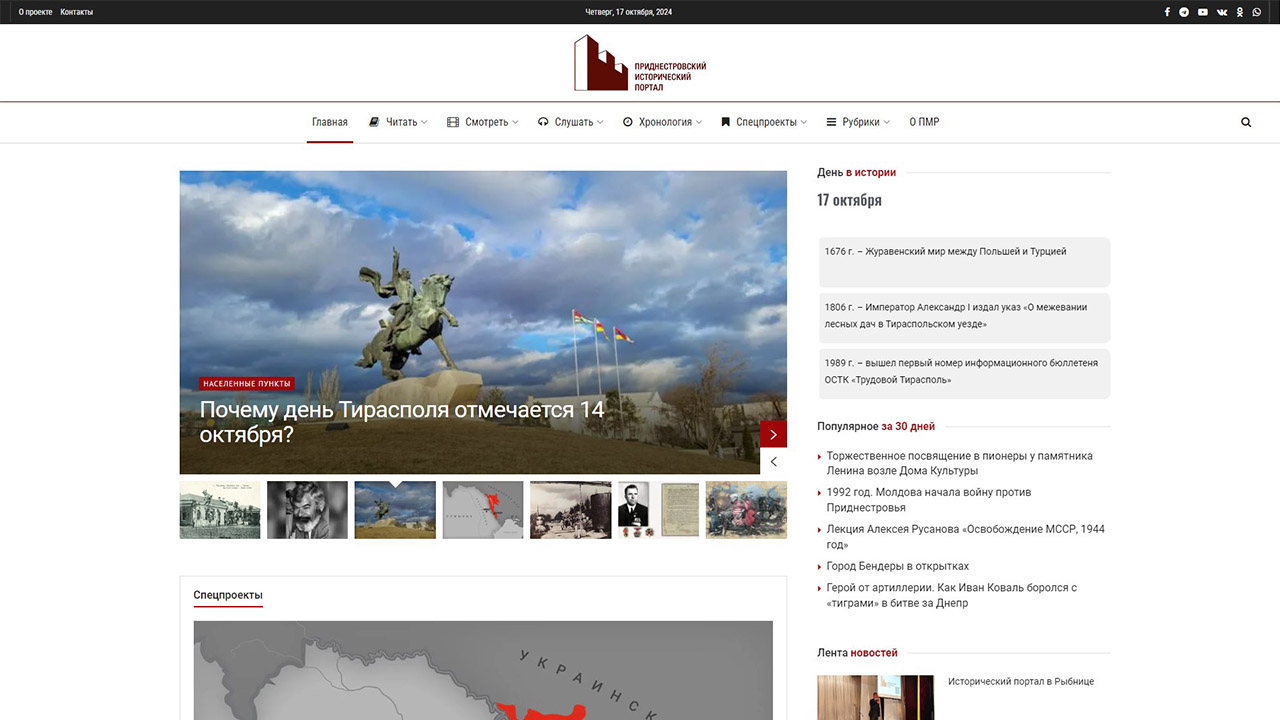The presentation of the Pridnestrovian Historical Portal took place in the city of Rybnitsa. Students from general education schools gathered in the city's cultural center, for whom the web resource will not only be interesting, but also useful in the context of preparing for classes.
Tatyana Trifonova, editor of the Pridnestrovian Historical Portal support department, spoke about how and why the site was created, which collects materials on the history of Pridnestrovie.
"Here, materials on various periods of the history of our region from ancient times to the present are accumulated in modern formats, archival documents, books and audio books, documentaries, audio podcasts, and various multimedia projects are posted. The portal contains biographies of outstanding historical figures who are directly related to Pridnestrovie," Trifonova said. In the Historical Portal, you can find materials about archaeological finds and the life of ancient peoples who lived on our territory thousands of years ago, about mysterious artifacts of the so-called "dark ages", about the events of the Russian-Turkish wars of the 18th century, the emergence of cities and villages, etc. Detailed and interesting materials are collected on the 20th century - old photographs of Tiraspol, events of the Civil War in Russia, the formation and development of the first republic in Pridnestrovie - the MASSR, battles of the Great Patriotic War, economic development of the 60-80s. Research dedicated to the Moldavian-Pridnestrovian conflict, the proclamation of the Pridnestrovian Moldavian Republic and the war of 1992 will allow you to create a complete historical picture of the era. Video materials and audio podcasts published on the Historical Portal are dedicated to various historical topics. You can even watch and listen on your phone.
The portal's library is regularly updated - books and magazines are digitized and published, such as, for example, "Tiraspol on the Edge of Centuries" by Vladimir Polushin or the Historical Almanac of Pridnestrovie - a collection of unique author's materials.
The presentation of the portal was supplemented by a speech by historians. They prepared interesting reports dedicated to the 80th anniversary of the liberation of Pridnestrovie from the fascist occupation. The head of the Museum of Military Glory of Rybnitsa, Alexander Stetsky, spoke about what happened in the city during the occupation of 1941-44, and also presented a documentary about the liberation of the Rybnitsa Region in the spring of 1944. The film reconstructs in detail the military actions in which Soviet and German armored vehicles clashed. The author of the film cited excerpts from the award sheets of the Red Army soldiers who distinguished themselves in the battles for Rybnitsa. Vyacheslav Sodol, a candidate of historical sciences, presented a study on the participation of the clergy of the Rybnitsa District in the liberation of Pridnestrovie from the fascists. He noted that the clergy helped several hospitals of the Red Army. The soldiers of the Red Army were also supported by the patriotic rectors who remained in their parishes after the escape of the Romanian priests. For example, Mikhail Pashinsky, a priest of the Assumption Church in the village of Botoşani in the Rybnitsa District, fed and watered at least 50 Soviet soldiers during the passage of the front. When the front was settled three kilometers from his village, he sent about 20 poods of baked Easter bread and more than 1,000 boiled eggs to the trenches. Then he took patronage over the military hospital deployed in the village and supplied it with all the necessary products for two months. While the kitchen was being set up, this priest personally fed the wounded command staff for a whole week, and also collected 10 thousand rubles from his parishioners and deposited them in the Rybnitsa State Bank for the benefit of war invalids - Red Army soldiers and their commanders. Historian and journalist Alexander Koretsky spoke about the meaning of the word "Pridnestrovye" (this is how the fascists called the territories between the Dniester and Southern Bug rivers they occupied) and explained why it is not suitable for designating Pridnestrovie. He emphasized that these words have different meanings both in meaning and in historical nature. "Pridnestrovye" is not a translation of the word "Pridnestrovie", it means the territory beyond the Dniester, while Pridnestrovie is the territory near the Dniester and is translated into Moldovan as Nistrenia. At the same time, we should not forget that "Pridnestrovye" is first and foremost a fascist term that left a negative background in the history of Pridnestrovie," Koretsky emphasized. The journalist explained who introduced the term "Pridnestrovye," how it came into use, and when it was mistakenly borrowed by other languages. He noted that today it is necessary to correct the error and eliminate the use of the word "Pridnestrovye" in relation to Pridnestrovie. More information on these topics can be found on the Historical Portal of Pridnestrovie.








